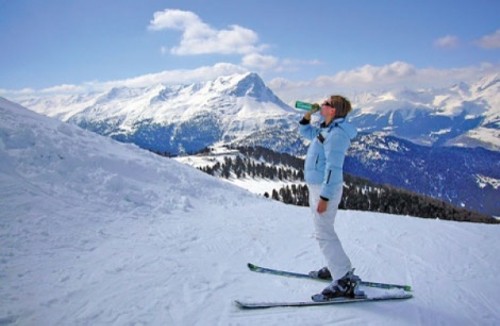Winter Waterland
It may not be hot, but dehydration is still a concern for winter activity.
By Wina SturgeonWhat? Not true? You sweat a lot in winter? And there’s more chance of dehydration when it’s cold?
Yes indeed. You sweat during winter activity, even if it doesn’t run down your back like in summer weather. So, you do need a lot of water. Dehydration can be even more of a danger because most people don’t know the winter warning signs to look for as they ski or snowboard or sled or snowshoe. Worse, the human body works differently in the cold and at higher altitudes.
Most of us forget that the Wasatch Front is at a higher altitude: We’re 4,000 feet up. Go to the mountains, or even just to Park City, and you can quickly gain another couple thousand feet. Because of this, you could be getting so dehydrated in winter if you’re doing something active that you may be on the verge of physical trouble without even realizing it.
First, the science. People think there’s less oxygen at altitude—less, for example, at the top of Alta’s High Rustler than at Malibu Beach: not quite true. It isn’t the oxygen amount that’s different so much as the atmospheric pressure. At sea level, you’ve got the weight of all this atmosphere pressing down, so it’s easy to breathe in sufficient oxygen. But at altitude, when you’re higher up in the thin layer of earth’s atmosphere, there isn’t as much air pressure surrounding you. Therefore, you don’t take in as much oxygen with each breath. The natural result is that we breathe a little faster in order to get all the oxygen we need. Even if our bodies adapt on a local level, as they do, it still changes if we go to a higher altitude—like the mountains. As a result, our metabolism increases. We breathe harder, even gasping for breath if we’re being active. Of course, after every breath, you exhale—and with every exhalation, you breathe out water.
But that changes to even more internal water loss in winter. Ever wondered why it seems that you have to pee more often when it’s cold? That’s not your imagination. Your body tries to protect you against the cold by keeping your skin warm, and it does this by narrowing the blood vessels closest to the skin to keep warm blood away from the coldest parts of the body. But this also reduces the overall volume of blood, and the water from that blood has to go somewhere. Skipping all the details, it ends up in your bladder. So you now have to pee, thus losing more water.
Other factors add to the winter-dehydration issue. We are not as sensitive to thirst in winter as we are in summer. We don’t feel thirsty, even when we are, so we tend to drink less liquid. And, we tend to drink more alcohol and coffee in winter. Both beverages are diuretics that make our kidneys work harder, and so we lose even more water. In addition, even though we don’t feel ourselves sweating as much in cold weather, we certainly do sweat. If you’ve ever smelled your shirt after a day of snowriding, you know this only too well.
The symptoms of winter dehydration are often ignored because they’re so subtle, and so often blamed on something else. The most common symptom of dehydration is a headache, even a mild one. Then comes lightheadedness or dizziness, followed by muscle weakness and cottonmouth. Don’t ignore any of these symptoms—they’re telling you to drink up.
You can make drinking outdoors in winter more pleasant by using an insulated bottle or hydro system and filling it with warm water. You can make sure you don’t forget to hydrate by setting a time for it, since you may not feel thirsty. So drink a cup or more of water at the top of every hour—or every time you have to pee. In winter, they’re about the same.
Speaking of Winter, dehydration
-
Monday Meal: Wintry Slow-Cooked Beef Daube Provencal
- Jan 9, 2017
-
Salt Lake Acting Company: Winter
A chat with the playwright and leading actress from the latest SLAC production.
- Oct 11, 2016
-
Snowmageddon in Bountiful
- Jan 23, 2012
- More »
More by Wina Sturgeon
-
Conquer the Superpipe
Some advice to help you take the plunge
- Jan 8, 2013
-
Park City Shortcuts
Bypass the traffic and be on your way
- Dec 24, 2012
-
Ride the Terrain Park
Start learning or polish your skills
- Dec 11, 2012
- More »



